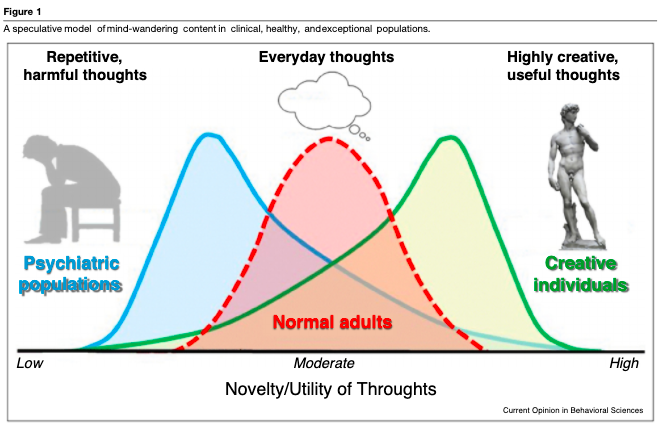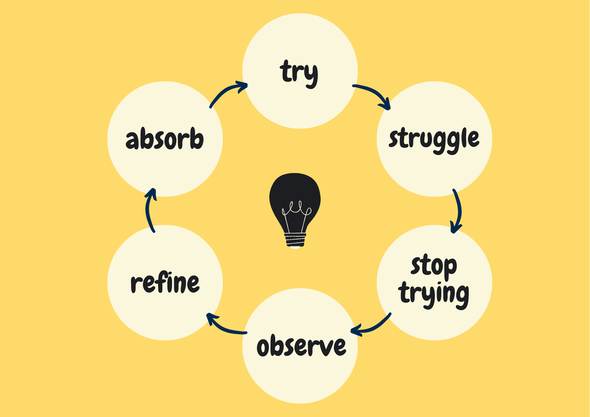|
Whether your goal is to generate more business ideas, figure out how to get new ideas for your writing, or just have better ideas in general, the State Shift Technique works. With that, let's dive right in and start with a story. Discovery In August of 1928, at St. Mary's Hospital, the celebrated medical researcher Alexander Fleming was working on a strictly academic problem. His task was to identify and isolate different strains of the bacteria Staphylococcus Aureus. There was no promise of any groundbreaking discoveries or historical legacy. In fact, it was a rather straightforward process of cataloguing and classification. And so, Fleming did what any creative, respectable scientist would do when faced with a drawn-out stretch of work. He went on vacation. By many accounts, Fleming's workspace was disorganized and chaotic. When he came back to St. Mary's after his leisurely visit to Suffolk, he had to deal with the mess of bacteria-laden petri dishes that he had left lying around. However, he noticed that some of petri dishes sitting next to an open window had been contaminated with a type of Penicillium fungus. The bacteria he had been studying was conspicuously absent from the space marked by the yellow mold. "That's funny", he famously remarked while examining the source of one of the biggest medical discoveries of the century. Unless you intentionally blocked your ears and howled "I can't hear you" throughout most of high school, you probably know that Fleming's accidental discovery of penicillin was a pretty big deal. While it wasn't until decades later that the antibiotic would be mass produced (largely through the efforts of Howard Florey and Sir Ernst Chain), Fleming's contribution started the chain of events that has since saved the lives of hundreds of millions of people. Was the discovery pure luck, or was it something more? Is there a kernel of truth in this story about how great ideas arise that we can use to have more of them? The Backwards Law at Work One sometimes finds, what one is not looking for. When I woke up just after dawn on September 28, 1928, I certainly didn't plan to revolutionize all medicine by discovering the world's first antibiotic, or bacteria killer. But I suppose that was exactly what I did." Often, the things you chase after the most, like money, status, and power, end up eluding you. It seems as though the more you accumulate, the more you lack. The reverse is also true. When you stop seeking, desiring, and striving, opportunities seem to arise out of nowhere. For billionaire hedge fund manager Ray Dalio, money was never really the objective, but rather the side effect of doing well at his job. If he had been worried about building wealth and accumulating power, he never would have come across his time-tested principles that led him to success. Ideas often follow this principle as well. The more you hunt them down, the more they become an endangered species. The more you allow them to proliferate of their own accord, the more they voluntarily approach you (and eat right out of your hands!) Had Fleming tried with all his might to uncover a new earth-shattering scientific insight, he probably wouldn't have gotten anywhere. He would have been too busy forcing reality to conform with his ideas instead of allowing room for serendipity. In fact, Fleming's other massive contribution also happened by fluke. When he bent over to examine a plate of bacteria, a drop of mucus fell from his nose and created a curious reaction. This led to the discovery of lysozyme. I strongly doubt anyone would have thought to deliberately apply bodily fluids to the research samples. Thank God he wasn't a compulsive nose-wiper. But I digress. In The Subtle Art of Not Giving a F*ck, Mark Manson uses the Backwards Law to make a provocative point: don't try. Trying implies seeking something that you don't have, which only leads to suffering. And while there is some truth to that statement, I think that some context is important here. Not trying is only part of the equation. Alexander Fleming didn't give up entirely, pack up his things and move to a Buddhist monastery. He had already spent nearly two decades developing his research and scientific thinking skills. Through his previous efforts, he was in a perfect position to make sense of his discovery. As Louis Pasteur wrote, "fortune favours the prepared mind". There is a formula behind Fleming's discovery. While it may not work in every case, the principles are time-honoured and show up in the lives of many successful people, from Woody Allen to Larry Page. In order to have great ideas, here is a handy process you can follow:
The State Shift Technique (in Six Simple Steps) 1 - Immersion If you want to have great ideas, first you must immerse yourself in the relevant information. By soaking up the important material in your desired field or subject, you unconsciously prime your mind to begin generating new insights. Reading books written from multiple perspectives on a single topic can provide you with more nuance. Listening to audiobooks and lectures can help bring the material to life. Creating an environment where you can have conversations and debates about a topic will help to steep you in it. If you are wondering how to get story ideas, digesting many, many stories from other authors can only help. The aim is to absorb as much knowledge as you can. Immersion is simply the act of preparing the mind for the work to come. Fleming had an environment conducive to research and inquiry at St. Mary's. He was surrounded by experiments, the right equipment, and other bacteriologists. His tendency toward disorganization meant that he encountered just the right amount of randomness. All of these factors contributed to his incredible findings. 2 — Effort This is the conscious stage of thinking and idea generation. It is the "trying" phase. The most helpful thing to do here is have a process. The more predictable the routine, the more effective stepping outside of it will be later on. James Altucher, author of Skip the Line, recommends becoming an idea machine. You can do this by coming up with ten new ideas a day, every day. It doesn't matter if they are good or bad. All that matters is that you have them (or they have you), and that you write them down in a journal or notebook. Following the ten ideas a day system yields up to 3,650 ideas a year. If even a handful of those ideas end up being really great, then Altucher's routine has paid off handsomely. As a polymath and author of 20 books, he has seemingly figured out how to generate innovative ideas without resorting to any controversial forms of black magic (that I know of). While our good old chap Fleming didn't come up with the idea to contaminate a plate of bacteria with a mould sample, he did come up with original ideas to test his hypotheses. He tried penicillin on different types of microbes, tested other types of fungi, and determined that penicillin was most effective on some of the most infectious bacteria. You may be working toward some particular aim, but that doesn't mean you need to be closed off to the possibilities that may arise. Keeping an open mind during the effortful process is a hallmark of many creative thinkers. 3 — Struggle Runners hit "the wall". Writers suffer from writer's block. Athletes have losing streaks. Creatives come up with bad ideas. Every field has its struggle phase. Rather than something to be avoided, struggling is an essential part of the idea generation process. In an article on learning anything faster, I refer to Andrew Huberman's research on how struggle actually primes the brain for neuroplastic change. In Fleming's case, attempts at innovation may have been prevented by the curse of prior knowledge. It is hard to look at problems differently when the prevailing wisdom looms so large in every researcher's mind. He recognized this problem in his 1945 Nobel Prize acceptance speech: To my generation of bacteriologists the inhibition of one microbe by another was commonplace. We were all taught about these inhibitions and indeed it is seldom that an observant clinical bacteriologist can pass a week without seeing in the course of his ordinary work very definite instances of bacterial antagonism. It seems likely that this fact that bacterial antagonisms were so common and well-known hindered rather than helped the initiation of the study of antibiotics as we know it today." Struggle is an inherent part of the human experience. Without it, there wouldn't be any reason to change. Being sure that you know something takes away the possibility of coming up with new ideas that might contradict it. Grappling with the unknown is vital to the process of discovery. The bad ideas you might have at the beginning pave the way for the good ideas to come later. 4 — Give Up Go on vacation. Take a thirty minute shower. Nap for a bit. Take a walk in the park. Try heroin or cocaine. Or don't. Maybe just don't. Nothing good will come of staying in a state of strenuous effort and struggle forever. When in doubt, shift your state into one of relaxed I-don't-give-a-f*ckedness. Meditation is a great way to leverage this step. When you are sitting in stillness and being present, your mind naturally becomes an idea magnet. By trying not to have ideas, your brain will entice you with the best, most tempting ideas it can muster. This is the stage where the backwards law kicks in. By accepting that you won't have to come up with any brilliant ideas, your mind ironically becomes unshackled and can begin spitballing little wet nuggets of wisdom. Recently, I was driving a motorbike along the winding, pothole-ridden roads of a Thai Island. I had no intention of thinking about anything, and was in a state of calm alertness. Suddenly, I was hit with a tidal wave of interrelated ideas. I could see these ideas in my mind's eye, and manipulate them easily. It was weird. These results were the product of a wandering mind, not a deliberate, focused one. It turns out that the relationship between creative ideas and mind wandering plays a role in the success of many iconic figures. Larry Page came up with the algorithm for Google in a dream. Salvador Dali took short periods of rest, where he would enter into a state of hallucinatory consciousness between wakefulness and sleep(which explains his freaky awesome paintings). Stephen King came up with many of the ideas for his stories while daydreaming. Many creative ideas come when initial effort has been internalized, and the intuitive, subconscious mind can work freely on a problem. On the flip side, many of the negative thoughts that we experience are the result of trying too hard to suppress and control our thoughts. If you want to come up with great ideas and move more toward the right end of the graph pictured above, try carving out some time to stop trying. I think you'll be pleased with the results. 5 — Observe and Report Once you have gone through the four previous steps, it is time to pay close attention. Your mind may produce great ideas during a dream, a walk, or a shower, but they can also pop out of existence just as quickly and easily as they arrived. Noticing these ideas and documenting them is so important. If Fleming hadn't been the keen observer that he was, he would have tossed out the contaminated samples without a second thought. In his speech, Fleming recognizes the importance of this quality: "my only merit is that I did not neglect the observation and that I pursued the subject as a bacteriologist." Two ways to do this are meditating to sharpen your powers of concentration and attention, and keeping an idea journal to capture any drifting motes of genius. Curiosity also plays a huge role. In Adam Grant's latest book Think Again: The Power of Knowing What You Don't Know, he paraphrases Isaac Asimov, who suggested that "great discoveries often begin not with “Eureka!” but with “That’s funny . . .” Have you ever noticed that our attention is heightened when we are curious? It is as if the world suddenly becomes a bit more vibrant and filled with potential. This isn't just an anecdotal observation. According to research, positive states of being like curiosity and contentment result in seeing more possibilities and opportunities in life. 6 — Refine No one state of being leads to a great idea. Instead, a discovery or insight is the result of shifting between multiple states.
The more we are able to take charge and move from one perspective to another, the more great ideas we will have. The last stage is refining your idea(s). They may not be fully formed yet. Adding some shape and detail to them will only work out in your favour. If you are struggling to come up with better ideas for your business or your writing, try a little experiment. Identify which state you are currently in, and make a switch. Notice where your mind goes, but let it wander. Have a short nap at your desk, provided your boss isn't around. When you come up with the next Google, make sure to give credit where credit is due (note: I accept warm praise and Dogecoin). Comments are closed.
|




 RSS Feed
RSS Feed
